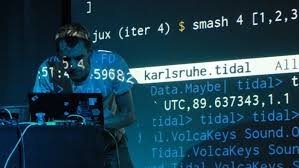Livecoding : Différence entre versions
(→Documentation) |
(→Documentation) |
||
| Ligne 32 : | Ligne 32 : | ||
<code>p1 >> pluck([0, 2, 4], dur=[1, 1/2, 1/2], amp=0.75)</code> soit pour CMajor = [C, D, E, F, G, A, B], les notes suivantes : CMajor[0] => C, CMajor[2] => E, CMajor[4] => G | <code>p1 >> pluck([0, 2, 4], dur=[1, 1/2, 1/2], amp=0.75)</code> soit pour CMajor = [C, D, E, F, G, A, B], les notes suivantes : CMajor[0] => C, CMajor[2] => E, CMajor[4] => G | ||
* jusque là, tout va bien <code>d1 >> play("(x[--])xo{-[--][-x]}")</code> | * jusque là, tout va bien <code>d1 >> play("(x[--])xo{-[--][-x]}")</code> | ||
| − | * Pattern : | + | * Pattern : my_pattern = Pattern([0, 1, 2, 3]) ou my_pattern = P[0, 1, 2, 3] |
| + | cool <code>>>> print(PRange(0, 10, 2).reverse() + [1, 2]) </code> <code>P[9, 8, 5, 4, 1, 10, 7, 6, 3, 2] </code> | ||
==Sonic Pi== | ==Sonic Pi== | ||
Version du 13 février 2019 à 14:25
Présentation de logiciels de livecoding
- installation
- test
- démo
FoxDot
Installation
- suivre https://foxdot.org/installation/
- sudo apt install python-pip
- pip install FoxDot
- sudo apt install supercollider
- sudo apt install git
- sudo apt install python-tk
c'est ok ensuite Sinon, il y a ce script https://github.com/Noisk8/InstalandoFoxDot-En-linux
Documentation
- https://docs.foxdot.org/
- Pour le lancement, c'est facile : https://docs.foxdot.org/docs/getting-started/making-your-first-sounds/
En résumé, dans le Terminal faire : python -m FoxDot
Puis dans la fenêtre p1 >> pluck() ça fait du son, p1 >> pluck().stop() ça s'arrête.
- La liste des synth : ['sawbass', 'karp', 'gong', 'varsaw', 'bell', 'feel', 'scratch', 'pulse', 'audioin', 'blip', 'pads', 'rave', 'donk', 'saw', 'orient', 'creep', 'growl', 'marimba', 'razz', 'dub', 'pasha', 'keys', 'jbass', 'arpy', 'zap', 'viola', 'piano', 'quin', 'ambi', 'dbass', 'crunch', 'noise', 'star', 'bass', 'dab', 'dirt', 'twang', 'swell', 'pluck', 'glass', 'soprano', 'charm', 'spark', 'bug', 'squish', 'sitar', 'snick', 'play2', 'play1', 'sinepad', 'prophet', 'ripple', 'space', 'fuzz', 'lazer', 'klank', 'nylon', 'soft', 'scatter', 'loop']
qu'on peut lancer par un p1 >> scatter()
- Un peu d'explication sur les notes jouées, et à quoi correspond la suite de nombre suivante en note :
p1 >> pluck([0, 2, 4], dur=[1, 1/2, 1/2], amp=0.75) soit pour CMajor = [C, D, E, F, G, A, B], les notes suivantes : CMajor[0] => C, CMajor[2] => E, CMajor[4] => G
- jusque là, tout va bien
d1 >> play("(x[--])xo{-[--][-x]}") - Pattern : my_pattern = Pattern([0, 1, 2, 3]) ou my_pattern = P[0, 1, 2, 3]
cool >>> print(PRange(0, 10, 2).reverse() + [1, 2]) P[9, 8, 5, 4, 1, 10, 7, 6, 3, 2]
Sonic Pi
TidalCycle
Installation
en suivant ceci : https://tidalcycles.org/index.php/Linux_installation
- ce script modifié : https://github.com/yaxu/Tidal/blob/master/doc/install-linux.sh cela donne cela :
http://etherpad.pingbase.net/tidal-install
- install ATOM, SuperDirt dans SC
Code libre : http://etherpad.pingbase.net/tidal
Ibniz
- La meilleure documentation de la terre est là : https://ressources.labomedia.org/ibniz
Punctual
Ressources
Artistes ou collectifs
- Medellin : https://noiskate.hotglue.me/ - Rennes : https://merri.carrd.co/?fbclid=IwAR0XelyJVkS8d4nh9IxXr7hS0refxnp3qDsn69RaTGGKp8gxppP351Ft6v8 - Mars : https://fg1er.noblogs.org/
Espace de discussion
- Welcome to LURK, a new host for discussions around cultural freedom, experimental, new media art, net and computational culture, and things like that : https://talk.lurk.org/channel/livecode
